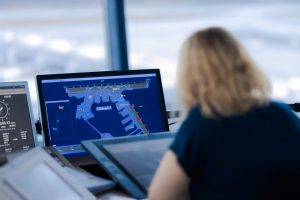COLA: Fatigue study on the impact of pandemics on air traffic controllers’ work situation
 A research study is currently underway where LFV is conducting fatigue studies on various shift rotations and exploring Covid-related impacts on the work situation of air traffic controllers.
A research study is currently underway where LFV is conducting fatigue studies on various shift rotations and exploring Covid-related impacts on the work situation of air traffic controllers.
Maximilian Peukert, Human Factors Specialist at LFV’s Research and Innovation Unit and one of those working in the COLA (Controller and Friend Alertness Study) project, explains:
“Everyone has probably experienced that their attention can decrease during a long drive due to increased tiredness or fatigue. This is also relevant in aviation.
Fatigue among operational staff should be controlled as much as possible in order to maintain the high level of safety, but also to promote individual health. For example, shift work and uncomfortable working hours can have a long-term negative impact on health. Therefore, we are conducting the COLA study as a first step towards better understanding fatigue and its impact on air traffic controllers’ work situations.
We are particularly interested in how fatigue develops during a single work shift, during several subsequent work shifts during a work episode, and over a longer period of months or even years.
We look at how, for example, fatigue develops when you mainly work night shifts or when night shifts are followed by day shifts. With the ongoing pandemic, we have also wondered if it has an impact on fatigue in the workplace.
For example, could it be that it leads to faster fatigue due to too little traffic, especially during day shifts?”
Research results for operational activities
The study is a research project where the results will be evaluated and discussed scientifically but also made available for LFV’s operational activities.
“We aim to develop the business further based on the results. We do not want to bore smart adults with the same general information over and over again – like going to bed early. Instead, we have a vision to establish holistic measures and recommendations, such as work shifts that are adapted to each other or individual chronotypes,” says Maximilian Peukert.
Increased automation, which can also cause fatigue, will affect the work environment, and concrete measures, recommendations or changes in the work environment can be tested at a later stage.
Pandemic-adapted implementation
The situation with the ongoing pandemic has meant that the study cannot be monitored directly on site. Therefore, a completely digital implementation was chosen where the study participants answer an online questionnaire in advance.
Maximilian Peukert explains:
“The main study is carried out on a computer at one of our control centres, where participants are guided through various questions together with information about reaction time using our test software.
We have already had very good experiences of this approach from the first study in the autumn of 2020. The participants were able to carry out the study flexibly and easily even without guidance on site.
This is the second study and here we focus on night shifts, with a protocol for self-assessment to determine how fatigue changes in the short term during the shift.
Later, the research study will also collect data from other service locations.”














